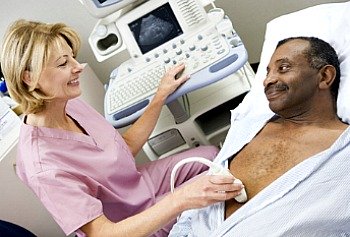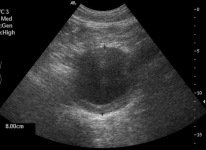Abdominal Ultrasound Scan
Everything You Need To Know
What Is An Abdominal Ultrasound?
An abdominal ultrasound scan is a type of test which uses sound waves that bounce off the organs in the abdomen and the shadow created are reflected back through a transducer unto a computer screen.

It is also called an abdominal sonography or ultrasound scan of the abdomen. Sound waves or sonar at a higher frequency than those that could be heard by human ears are produced by a machine and directed at organs in the abdomen using a probe.
As the waves passes through the skin into the cavity of the abdomen, any change in the density or texture and shape is recorded and the shadow or "echo" from the sound wave is captured and send back into a computer screen.
The computer is able to make a two or three dimensional (2 or 3-D) image of the structures the sonar wave passed through, by calculating the shape, dept, size and texture property of such structures or organs. A picture is now produced and read by the sonologist or expert that interprets such images, giving you a report of what was seen.
What Structures Can An Ultrasound Scan Of The Abdomen Identify?

An ultrasound of the abdomen can see the liver, gallbladder, spleen, pancreas, kidneys, and the blood vessels like the aorta that carry blood to and from these organs.
It can also pick up the presence of fluids, including blood or abnormal secretions in any part of the abdomen. With a Doppler technology, an ultrasound scan of the abdomen can be used to identify the flow of blood through the artery and veins of the abdomen.
Ultrasound scan of the abdomen cannot help with bones. It can pick up a structural abnormality in a big nerve.
What Are The Possible Conditions An Ultrasound Scan Of The Abdomen Can Look For?
There are many reasons to have images taken
of the abdominal organs with an ultrasound machine. The possible conditions or situation that may require an ultrasound scan of the abdomen includes:
- To find out the reason a patient is experiencing pain in the abdomen
- To look for tumors or cancer
- To determine if there is a problem with the kidneys that is resulting in a urinary tract infection
- To look for stones in the gallbladder or the kidney
- To examine or diagnose a hernia
- To diagnose fluid in the abdomen, called ascites, which may be caused by liver disease or heart failure
- To look for any fluid that should not be in the abdomen after an injury, because it may represent bleeding
- To look for injuries
- To check the size, shape, and texture of the liver if your liver function tests are not normal
- To see if you have a pocket of infection, or abscess, in the abdomen which could be causing fever
- To try to determine why an organ in the abdomen is swelling
- To see if you have a tear or a weak section of blood vessel wall
- Your doctor may use an ultrasound to guide him as he directs a needle at a piece of tissue to get a sample for a biopsy
- If you have a lot of fluid in the abdomen, an ultrasound may also be useful to help your doctor safely guide the needle to the right area from which to drain the extra fluid
You doctor’s reasons for ordering the abdominal ultrasound will depend upon what symptoms you reported to him, and what he found on his physical examination and other diagnostic tests.
How Is An Ultrasound Scan Of The Abdomen Performed?
If you are wondering how an ultrasound scan of the abdomen is performed, be pleased to know that it is often a painless procedure. No needle or knife is involved. No need for you to be put to sleep.
- A doctor who is a specialist in interpreting imaging tests is called a radiologist. He or an ultrasound technician will perform the test in the ultrasound suite at the hospital or in the doctor’s office.
- You should take off all of the clothing that is in the way of the area to be examined by ultrasound. You will be given something to cover up with. You will lie on your back or side on an exam table, and a gel, which is warmed but often feels cool, is spread on the abdomen to help transmit the sound waves which make the images.
- The probe or instrument that the technician or doctor holds in their hand is attached to a computer on a rolling cart. This probe is called a transducer and whoever is performing the actual ultrasound test will press the transducer on your abdomen and roll it back and forth in different directions, while watching on a screen until the area of interest is seen. Then the operator will take a picture, perhaps measure with the computer, and will press the transducer and move it around some more, finding another organ.
After the test, which may take 20 to 30 minutes or less, is complete, you will be given something to wipe the gel from your abdomen, and then you will be able to leave. Your results will be given to you by the doctor who ordered the test, after the radiologist has interpreted the images from the abdominal ultrasound.
If your doctor took a tissue sample or drained some fluid, you may have to be observed for a short while. The doctor who ordered the test will let you know when the specialist has interpreted the images, and you will have an appointment in some cases if anything abnormal was seen.
How Should I Prepare For My Scan?
Generally, you will not require any major preparation for an abdominal ultrasound scan. The following are certain preparations that might be required in some cases.
Your doctor should know if you have had any study done with barium within the past two days, because it may interfere with the images acquired by ultrasound. Depending upon the reason you are having an abdominal ultrasound, your directions can vary a little bit.
- If you are having an ultrasound of the liver, gallbladder, spleen and pancreas, your doctor may ask to eat a meal that has no fat the evening before the test, and to abstain from eating for eight to twelve hours before the test.
- If you have having an ultrasound examination to look at your aorta, the largest blood vessel in the body, you may have to fast for eight to twelve hours before your test.
- If your abdominal ultrasound is focused upon the kidneys, then you may only have to drink some extra water before the test to fill your bladder.
- Because gas in the intestines can interfere with the pictures taken by ultrasound, some doctors may always prefer if you abstain from meals for eight to twelve hours before your abdominal ultrasound.
If you are having a scan of your lower abdomen or pelvis or during pregnancy, you will be required to drink at least 2 liters of water within the last hour before your test to help fill up your bladder.
Risks And Side Effects Of Ultrasound Scan
Sound waves are not like radiation. They are very safe. The test is portable and easy to use. It is also inexpensive when compared to other tests used to look at your abdominal organs.
Having said that, many researchers report that ultrasound scan can have very mild physical effects on the tissues. Such side effects of an ultrasound scan on the intestines include; "intestinal microvascular hemorrhage" - meaning bleeding from very very tiny blood vessels on the wall of the intestines and free radical generation.
There are a few studies in Sweden that reported another side effect of ultrasound scan noticed in children who were exposed to ultrasound scan in the womb - as almost all babies are today. They report that it seems to increase the likelihood of their developing left-handedness!
As can be seen from above, there is no serious side effects known with ultrasound scan of the abdomen or indeed anywhere.
If you have a scan booked or are thinking of going for one, do not let anything put you off from having it.
Abdominal Ultrasound Scan: Tell Us Your Story!
Have you or are you booked to have a scan of your abdomen? Any concerns, or perhaps did you get a scan report of your abdomen and wondering what it means? Post your abdominal ultrasound scan findings here and get help with interpretation of the jargons.
Tell us your story or experience with an abdominal ultrasound scan.
|
Help Keep This Site Going |

Return To Abdominal Pain Test Page From Abdominal Ultrasound Scan


